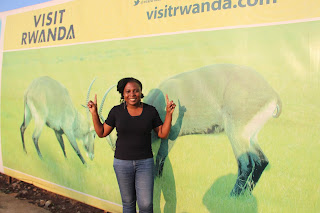Atlantic Fellows For Health Equity: Lessons Learned From Rwanda
When I was packing my bags for Rwanda a couple of days ago for the mid year convening of the Atlantic Fellows for Health Equity ,I remember my friend calling me and encouraging me visit the mountains and get a good view of mountain gorillas if possible and I thought to myself why not,that would be a life changing experience? So I embarked on a mission to have a life changing experience and learn from the so many successes and failures of the country and maybe have an eureka moment from seeing a famous mountain gorillas that inhabit the forest of Rwanda. Indeed it was a life changing experience filled with several eureka moments, but it was definitely not from seeing the gorillas, because that never happened. It was from hearing the stories of people who had lost so much yet grown so much. It was from seeing a country mold itself to something undeniably beautiful from so much chaos, terror, blood,hurts and unforgotten memories that changed woke up something in me.
This may be trite but the testimonies of Rwandan survivors and perpetrators taught me so much about inequity, it showed me how easy it is for an ordinary,decent person to buy into a mindset and be converted into something they were not through a systematic manipulation. Which is usually in three stages- dehumanisation, distancing, and desensitisation all which eventually leads to lost lives, displaced potentials and eventually inequity.
The implication of this is that each time genocide forces a woman to kill 6 of her children leaving one to tell the sour tale of death or a man is bound in the chains of mental health it creates a precedent, as well as a legacy, of refined ideas and methods.
What exactly am I getting at? A crime against humanity in one place is indeed a crime against all humanity. Therefore, the legacy of how we react to genocide or its many children like health inequity– or the legacy of how we fail to react has a wider consequence not just on us but also on generations unborn.
I ask myself this-
Why do some good men and women with the duty to act actually do nothing or so little? Perhaps we are too privileged to see that inequity has a ripple effect until it comes knocking on our doors.
Privilege is a tricky thing.
This made me think, even though I have had a history of being on the outside of the restaurant. I’m not constantly aware of the privileges I have now on a daily basis– no one is. After all some of us don't get up in the morning wondering where the next meaI comes from or what we are going to wear. The truth is we don’t feel a bit of our privileges when we sit in our cars for a one hour drive with pain in our calves only to meet the elevators at work broken. Sometimes we just think, oh, my life is just terrible, because the elevators are broken again. Sometimes, we are just not aware of our privileges, because the system generally works in our favor until we meet people like Bosco who would stop at nothing to change the Status quo. Then we begin to ask questions, what does the other side of privilege feel like?
You may not know what it feels like to walk several miles just to get a medication, but you can listen and do something!
Only when we listen to people and find answers to this question can we begin to eliminate biases. We must stop making generalizations about who deserves what based on factors such as ethnicity, gender, race, background, location, religion and socio-economic status. Winning the fight against health inequity isn’t about any other is ,neither is it about economic trends, it’s about people — men,women,children, it's about their stories and the choices they can voluntarily make. Unfortunately when we don't listen what we see are these people and the involuntary choices that they are forced to accept.
If there is one lesson I have not learned from seeing gorillas in Rwanda, it is that sustainable access to healthcare for all is still possible, but it depends on you, I and the entire community pushing ourselves to confront our privileges, listen to others , act and make intentional choices that will navigate a very opaque system of healthcare.
Thank you Atlantic Fellows for Health Equity for giving me the opportunity to learn from the beauty of Rwanda.





Comments
Post a Comment